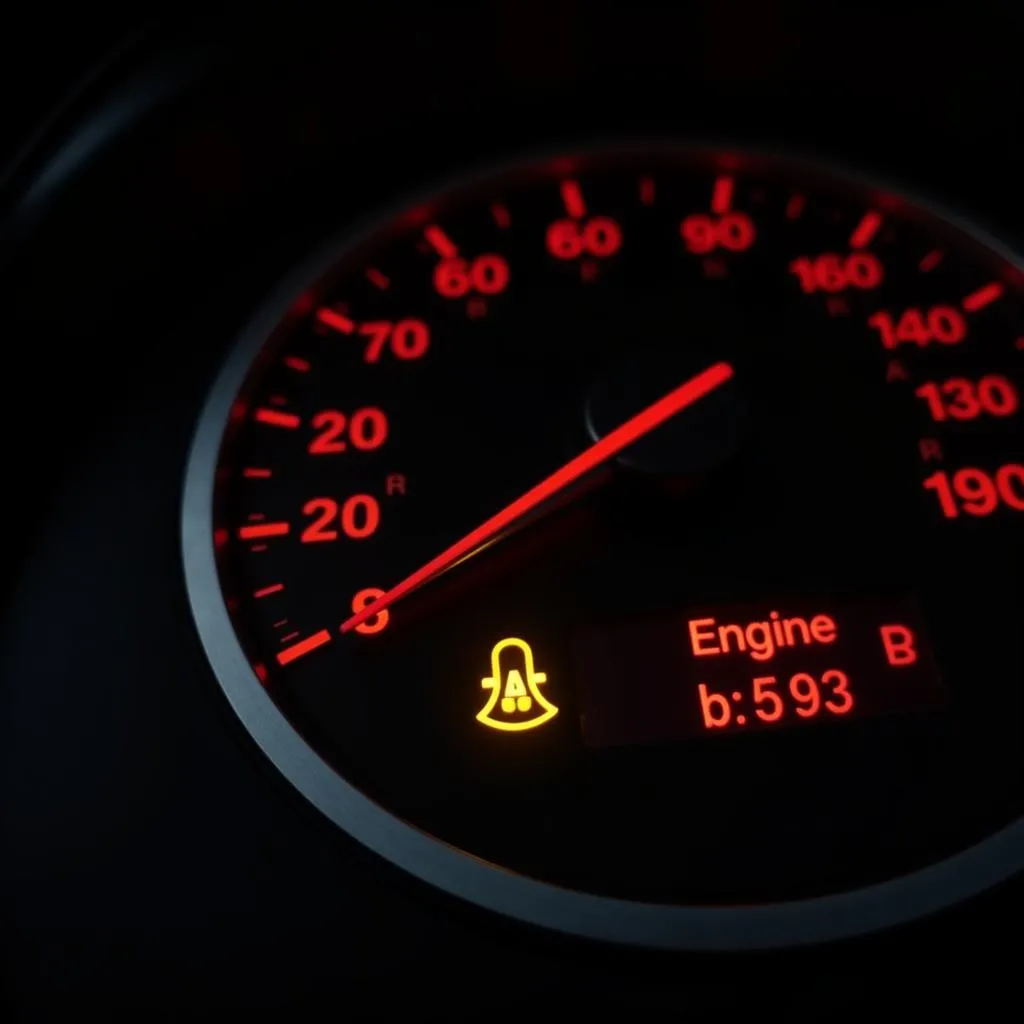Engine Malfunction BMW: Causes, Symptoms, and Solutions
The dreaded “engine malfunction” warning light on your BMW dashboard can be a source of anxiety for any driver. While BMWs are known for their performance and luxury, they can also experience engine problems like any other car. This article will delve into the common causes of engine malfunctions in BMWs, discuss the symptoms you might encounter, and provide insights into possible solutions.
 BMW dashboard with engine malfunction warning light
BMW dashboard with engine malfunction warning light
Understanding the Engine Malfunction Warning Light
The engine malfunction warning light, often accompanied by a generic “Check Engine” message, is your BMW’s way of telling you that something isn’t right with the engine management system. It could be something minor, like a loose gas cap, or a more serious issue requiring immediate attention.
Unlike warning lights that indicate specific problems, the engine malfunction light covers a broad spectrum of potential issues. To pinpoint the exact problem, you’ll need to read the Diagnostic Trouble Codes (DTCs) stored in your BMW’s Engine Control Unit (ECU).
Common Causes of Engine Malfunctions in BMWs
BMWs, especially newer models with complex electronic systems, can experience engine malfunctions due to a variety of factors. Here are some of the most common culprits:
- Oxygen Sensor Issues: The oxygen sensor monitors the oxygen levels in your exhaust to optimize fuel combustion. A faulty sensor can disrupt this process, leading to reduced fuel economy and increased emissions.
- Mass Air Flow (MAF) Sensor Problems: The MAF sensor measures the amount of air entering the engine, which is crucial for determining the correct fuel-to-air mixture. A malfunctioning MAF sensor can cause poor acceleration, rough idling, and even stalling.
- Spark Plug and Ignition Coil Failures: Spark plugs ignite the fuel-air mixture in the combustion chamber, while ignition coils provide the high voltage needed for spark plug operation. Worn-out spark plugs or failing ignition coils can lead to misfires, reduced engine power, and increased fuel consumption.
- Catalytic Converter Problems: The catalytic converter reduces harmful emissions from your BMW’s exhaust. A clogged or failing catalytic converter can restrict exhaust flow, leading to reduced engine performance, a sulfur-like smell, and even engine stalling.
- Vacuum Leaks: Vacuum leaks occur when there are unintended openings in the engine’s intake system. These leaks disrupt the air-fuel mixture, causing rough idling, hesitation during acceleration, and reduced fuel efficiency.
- Fuel System Problems: Issues with the fuel pump, fuel injectors, or fuel filter can disrupt the delivery of fuel to the engine, resulting in poor starting, rough running, and reduced performance.
 Mechanic inspecting engine bay of a BMW
Mechanic inspecting engine bay of a BMW
Recognizing the Symptoms of Engine Malfunction
While the engine malfunction warning light is a clear indication of a problem, your BMW may exhibit other symptoms that can provide clues about the underlying issue. These symptoms include:
- Illuminated Check Engine Light: This is the most obvious symptom and often the first sign of an engine problem.
- Reduced Engine Performance: You might notice a decrease in acceleration, power, and overall engine responsiveness.
- Rough Idling: The engine might vibrate excessively or sound erratic when the car is stopped.
- Increased Fuel Consumption: A sudden drop in fuel economy could indicate an engine problem.
- Unusual Engine Noises: Listen for any knocking, ticking, or hissing sounds coming from the engine.
- Stalling: The engine might suddenly shut off while driving, which can be dangerous.
- Black or White Smoke from the Exhaust: Unusual smoke color from the exhaust can indicate serious engine problems.
Diagnosing and Resolving Engine Malfunctions
If your BMW’s engine malfunction light comes on, it’s crucial to have the problem diagnosed and repaired by a qualified mechanic as soon as possible. Ignoring the warning light can lead to more severe engine damage and costly repairs down the road.
A mechanic will typically use a specialized diagnostic scanner to read the DTCs stored in your BMW’s ECU. These codes provide specific information about the problem area, allowing the mechanic to pinpoint the root cause of the engine malfunction.
Once the problem is identified, the mechanic can recommend the appropriate repairs. Solutions can range from simple fixes like replacing a faulty sensor to more complex repairs involving engine components.
Tips for Preventing Engine Malfunctions
While some engine problems are unavoidable, there are steps you can take to minimize the risk of encountering engine malfunctions in your BMW:
- Adhere to Regular Maintenance: Follow the recommended maintenance schedule outlined in your BMW’s owner’s manual. This includes routine oil changes, filter replacements, and spark plug checks.
- Use High-Quality Fuel and Fluids: Using the correct octane rating for your BMW and ensuring all fluids are topped off and in good condition can prevent engine problems.
- Address Warning Lights Promptly: Don’t ignore any warning lights on your dashboard. Address them promptly to prevent minor issues from escalating into major problems.
- Drive Responsibly: Avoid aggressive driving habits that can put unnecessary strain on your engine.
Conclusion
An engine malfunction in your BMW can be a cause for concern, but understanding the potential causes, recognizing the symptoms, and taking prompt action can save you from headaches and costly repairs. Remember to prioritize regular maintenance, address warning lights immediately, and seek professional help from a qualified BMW mechanic when needed.
FAQs
Q: Can I drive my BMW with the engine malfunction light on?
While you might be able to drive for a short distance, it’s not recommended. Continuing to drive with an engine malfunction could worsen the problem and lead to more expensive repairs.
Q: How much does it cost to fix an engine malfunction in a BMW?
The cost of repair varies depending on the underlying problem. Simple fixes like replacing a sensor could cost a few hundred dollars, while major engine repairs could run into thousands.
Q: Can I use an OBD-II scanner to diagnose the engine malfunction myself?
While you can purchase an OBD-II scanner, keep in mind that it might not provide the same level of detail as a professional-grade scanner used by mechanics.
Q: How often should I get my BMW serviced?
Refer to your owner’s manual for the recommended service intervals. Generally, BMWs require servicing every 10,000 miles or once a year, whichever comes first.
Still Have Questions?
For more information on BMW engine malfunctions or if you need assistance with your vehicle, please don’t hesitate to contact us. Our team of expert BMW technicians is available 24/7 to answer your questions and provide top-notch service. You can reach us via WhatsApp at +1(641)206-8880, email us at [email protected], or visit our workshop located at 276 Reock St, City of Orange, NJ 07050, United States.
You can also find helpful information on our website. For example, check out our articles on 2010 BMW 335i 0-60 performance, 2004 BMW Z4 3.0 i specs, and listings for 2020 BMW Z4 M40i for sale. We also have information on the 2014 BMW Z4 sDrive35is for sale and a 2005 BMW Z4 hardtop for sale.
